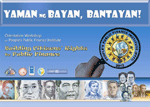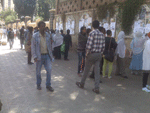Published on Thu, 2013-10-31 13:05
Social Watch Philippines (SWP), Silliman University in Negros Oriental and Mindanao State University (MSU) in the Autonomous Region of Muslim Mindanao (ARMM) launched the People’s Public Finance Institute (PPFI), which is the first-ever center on teaching citizens to learn and be actively involved in public finance in the Philippines. “As part of Social Watch Philippines’ commitment to asserting social development for people’s rights and empowerment, we are setting up PPFI centers in various State Colleges and Universities (SUCs) all over the country,” said former national treasurer and SWP lead convenor Leonor Magtolis Briones.“Through the Institute, SWP and SUCs will educate the general public, civil society organizations (CSOs) and interested local government officials on national and local public finance working under the framework of citizens’ participation,” she added. |
Published on Mon, 2013-10-28 11:56
In the early morning of October 3 a tourist was enjoying the beautiful quiet beach of the Italian Mediterranean Island when three swimmers appeared. Three African young men frantically asked for help. They had left their mothers behind in a ship on sea that was on fire. The ship had made the crossing that night and had reached the 800 perimeter of Lampedusa with over 500 passengers on board. While waiting to be able to offload the passengers, the ship was pushed away from the shore. When the captain tried to start the engine to bring his ship back into the perimeter, it didn’t work. He then decided to seek attention to get help by making a basket-fire. He burnt himself and threw the burning rod in the boat, rather than in the sea. The passengers on the boat panicked and rushed to one side. Inside the boat, in the cabins, women and children were asleep. Locked in the cabins, they would not survive the journey. Only six women made it alive. |
Published on Mon, 2013-10-28 11:26
The 68th session of the United Nations General Assembly (UNGA) ended with renewed commitment to anti-poverty targets and agreement to adopt new development goals in 2015. Women's rights advocates, along with diverse civil society organizations, critically engaged in debates calling for structural transformation that puts human rights and sustainability at the centre of the new development agenda. The 68th session of the UN GA that took place in New York 23-27 September 2013 was the first international inter-governmental process related to the Post 2015 Development Agenda and was intended to set out the formal process for governments to be involved in negotiations around the new development agenda, which have to date been led by the United Nations. |
Published on Mon, 2013-10-28 10:51
(Asmara 25 October) Members of Project Arbi Harnet (Freedom Friday) inside Eritrea have, this afternoon disclosed that fearing public discontent the Eritrean regime has ordered all Obituary notices of Lampedusa victims be taken off street notice boards in Asmara. Following the accident on the 3rd of October, off the cost of Lampdusa that claimed the lives of over 350 Eritreans, Asmara residents had put up customary notices with pictures of victims and many people were gathering to read those notices and expressing their anger at the political and economic predicament that is pushing young Eritreans to take extreme measures to leave their country. |
Published on Mon, 2013-10-28 10:08
The most important battles are generally the hardest fought. Such is the case of the financial transactions tax (FTT), a crucial element in the creation of a more just global financial system, which is facing renewed opposition from those who want to maintain the failed economic architecture of the past. |
SUSCRIBE TO OUR NEWSLETTER







